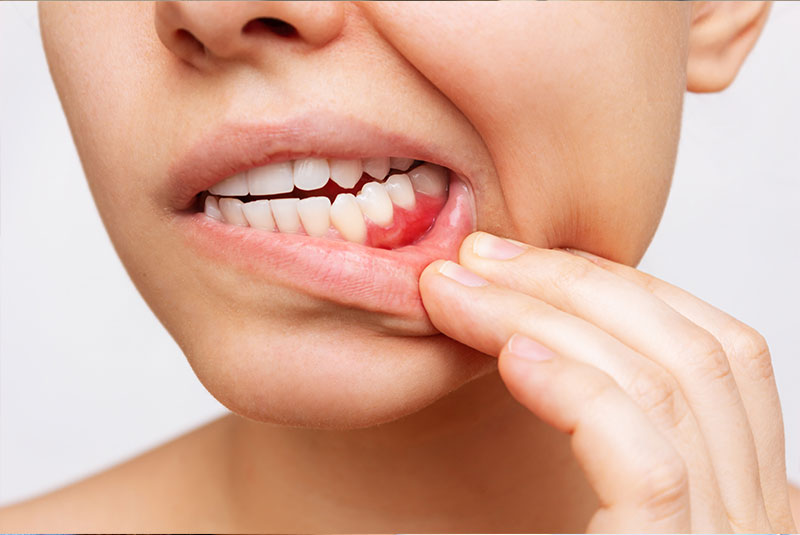

Gum disease is one of the most common oral health conditions. But how do you know if you have gum disease or if you’re more likely to develop the condition? Our Woodland Hills dentist discusses the gum disease risk factors and symptoms in our guide below.
If you’re experiencing any of the symptoms of gum disease mentioned, call Dr. John Chaves today at 818-491-7294.
Gum disease can lead to tooth loss, bone loss, and even cause systemic health conditions like cardiovascular disease, stroke, or diabetes complications.
Healthy gums should be firm and pale pink. If you notice that your gums are red, swollen, or tender, it may be a sign of gum disease.
Swelling: Swollen gums are a common symptom of periodontal disease. When the gum tissues are infected, they can become puffy and swollen. This swelling can make your gums appear larger than usual and may even cause them to protrude between your teeth.
Bleeding gums are one of the more common warning signs in the early stage of gum disease.
Persistent bleeding: Gum disease-related bleeding is often recurrent and doesn’t go away on its own. If your gums continue to bleed for an extended period, it’s essential to seek dental attention for proper diagnosis and treatment.
Periodontal disease can cause the gums to pull away from the teeth, creating pockets where bacteria can accumulate.
Bad breath, also known as halitosis, may also indicate the progression of periodontal disease.
Poor oral hygiene: Inadequate oral hygiene practices can worsen periodontal disease and contribute to bad breath. When plaque and food particles aren’t effectively removed from the mouth through brushing and flossing, they can decompose and provide a breeding ground for bacteria, leading to persistent bad breath.
Periodontal disease can cause the bone that supports your teeth to deteriorate, which can lead to loose or shifting teeth.
Tooth loss: If periodontal disease is left untreated and progresses to an advanced stage, the teeth may become so loose that they eventually fall out or require extraction due to the lack of support from the surrounding structures.
Gum disease can also cause changes in your bite, which is the way your teeth come together when you close your mouth.
Tooth wear: Periodontal disease can lead to changes in the way your teeth come into contact with each other during biting and chewing. This can cause uneven wear on the teeth, with some teeth experiencing excessive pressure or grinding against each other. Over time, this can lead to tooth wear, chips, or fractures, further contributing to changes in your bite.
In advanced periodontal disease cases, you may notice pus between the teeth and gums.
Foul taste or odor: Pus from a gum abscess can sometimes lead to a foul taste or odor in the mouth. This unpleasant taste or smell is a result of the bacteria and their byproducts present in the pus.

Several risk factors can increase the likelihood of developing gum disease, including:
Poor Nutrition: A diet high in sugar and carbohydrates can increase the risk of gum disease as it promotes the growth of harmful bacteria in the mouth.
In its early stages, gum disease can often be reversed through improved oral hygiene, such as brushing your teeth twice a day and flossing regularly, along with professional dental cleanings. However, if the disease has progressed to advanced stages, it may require more extensive treatment.
The best way to prevent gum disease is to practice good oral hygiene habits, including:
The treatment for gum disease will depend on the severity of the condition. In mild cases, improved oral hygiene and regular dental cleanings may be enough. However, more advanced cases may require scaling and root planing (a deep cleaning procedure), antibiotics, or even surgery.
At our dental practice in Woodland Hills, we offer gum disease treatment to restore your dental health and preserve your smile’s appearance. If you’re experiencing symptoms of gum disease, don’t wait until the disease progresses.
Call us today at 818-491-7294 to schedule your appointment. We’re committed to providing our patients with high-quality, compassionate dental care, and we look forward to helping you achieve a healthy, beautiful smile.
I understand the information disclosed in this form may be subject to re-disclosure and may no longer be protected by HIPAA privacy regulations and the HITECH Act.
